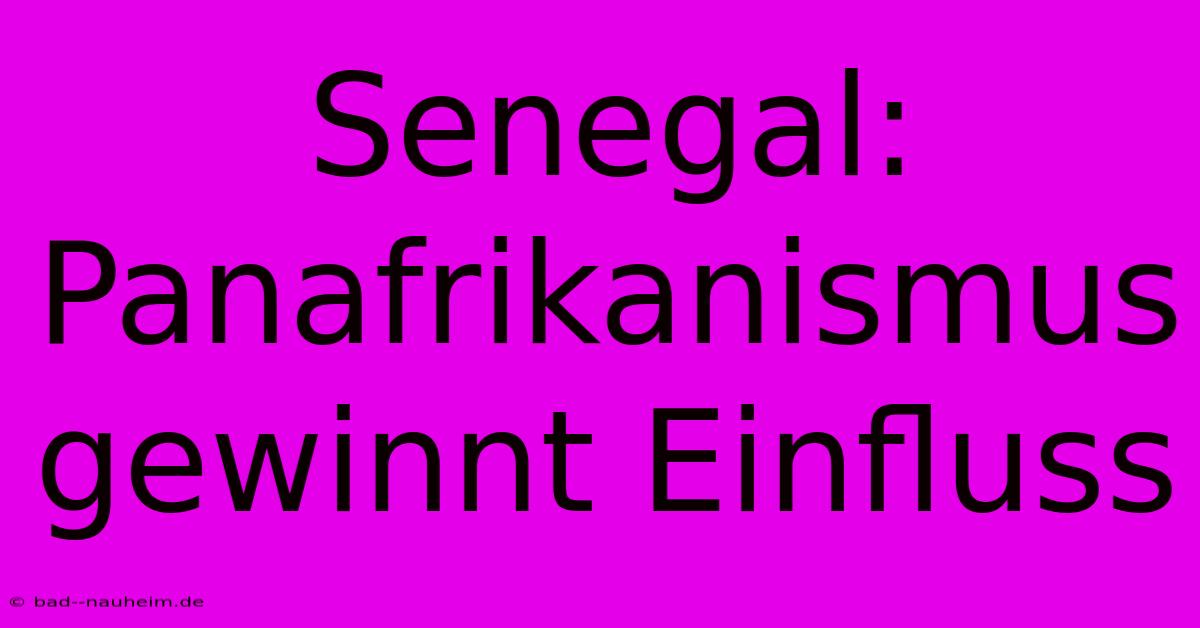Senegal: Panafrikanismus Gewinnt Einfluss

Discover more detailed and exciting information on our website. Click the link below to start your adventure: Visit Best Website Senegal: Panafrikanismus Gewinnt Einfluss. Don't miss out!
Table of Contents
Senegal: Panafrikanismus gewinnt Einfluss
Hey Leute! Let's talk about something really interesting: the growing influence of Pan-Africanism in Senegal. I've been following this for a while now, and it's fascinating to see how it's shaping the political and social landscape. It's not just some dusty old idea; it's a living, breathing movement with real-world consequences.
A Personal Journey into Senegalese Politics
A few years back, I was doing research in Dakar for a documentary (totally unrelated to Pan-Africanism at first, I swear!). I stumbled into a massive rally – thousands of people, flags everywhere, incredible energy. Turns out, it was a Pan-Africanist solidarity event, protesting something happening in another African country. I knew nothing about the intricacies of Pan-African thought before that day. It was a total eye-opener.
Initially, I was confused. I mean, I knew about Pan-Africanism – Kwame Nkrumah, the OAU, the whole shebang – but I didn't really get it. I thought it was mostly historical stuff, you know? But seeing those people, feeling their passion… it hit me differently. It felt visceral, almost electric.
Beyond the Books: Understanding the Movement
What I learned was that Pan-Africanism in Senegal today isn't just about historical unity. It's about economic independence, cultural pride, and resisting neo-colonial influences. It's about building strong relationships between African nations – and it's gaining serious traction.
Think about it: Senegal has always been a relatively stable country in a region that's, let's be honest, seen a lot of turmoil. But even here, there's a growing sense of frustration with external forces – economic exploitation, political interference, the whole nine yards. Pan-Africanism offers a powerful counter-narrative, a way to say, "We can do this ourselves."
I spent weeks afterwards just reading everything I could. I devoured books on Senegalese history, on Pan-African thought leaders, on the current political climate. I even tried (and miserably failed) to learn some Wolof – talk about a humbling experience! But the more I learned, the more I understood the significance of this movement.
The Practical Implications: Trade, Culture, and Politics
The impact of this renewed Pan-African focus is showing up in some fascinating ways.
-
Increased Intra-African Trade: Senegal is actively trying to strengthen its economic ties with other African countries. They’re reducing trade barriers, investing in regional infrastructure, and collaborating on projects that benefit the entire continent. That's huge, especially considering how much African trade historically relied on external powers. This increased trade leads to economic growth and job creation.
-
Cultural Revitalization: You see a real push to celebrate African culture and identity. From music and art to fashion and film, there’s a palpable sense of pride in Senegalese heritage – and that's spreading across the continent.
-
Political Solidarity: Senegal’s playing a more active role in regional politics, advocating for stronger African institutions and working to resolve conflicts peacefully. They are taking a leadership role in supporting other African nations facing challenges. This isn't just about lip service; it's about concrete action.
Challenges and Opportunities
Now, it's not all sunshine and rainbows. There are significant hurdles. Internal political dynamics, economic inequalities, and lingering colonial influences still pose massive challenges. It's not a quick fix, this Pan-African dream.
But the energy is palpable. The determination is undeniable. And, from what I've seen, the movement is gaining momentum. This isn't just some niche intellectual pursuit; it’s a grassroots movement with the potential to reshape the future of Africa. It's about reclaiming agency, building a brighter future, and that's pretty inspiring, even for a cynical old grump like me.
So, yeah. Pay attention to Senegal. It's at the forefront of a powerful movement. And that's worth knowing about.

Thank you for visiting our website wich cover about Senegal: Panafrikanismus Gewinnt Einfluss. We hope the information provided has been useful to you. Feel free to contact us if you have any questions or need further assistance. See you next time and dont miss to bookmark.
Featured Posts
-
U21 Em Quali Deutschland Verliert Gegen Tschechien
Nov 20, 2024
-
Velbert Wasserpegel Nach Regen Gestiegen
Nov 20, 2024
-
Unfall Val Thorens Verletzte Nach Seilbahnsturz
Nov 20, 2024
-
Black Friday Sennheiser Kopfhoerer Angebote
Nov 20, 2024
-
Abschlusserklaerung Reichtum Im Fokus
Nov 20, 2024
